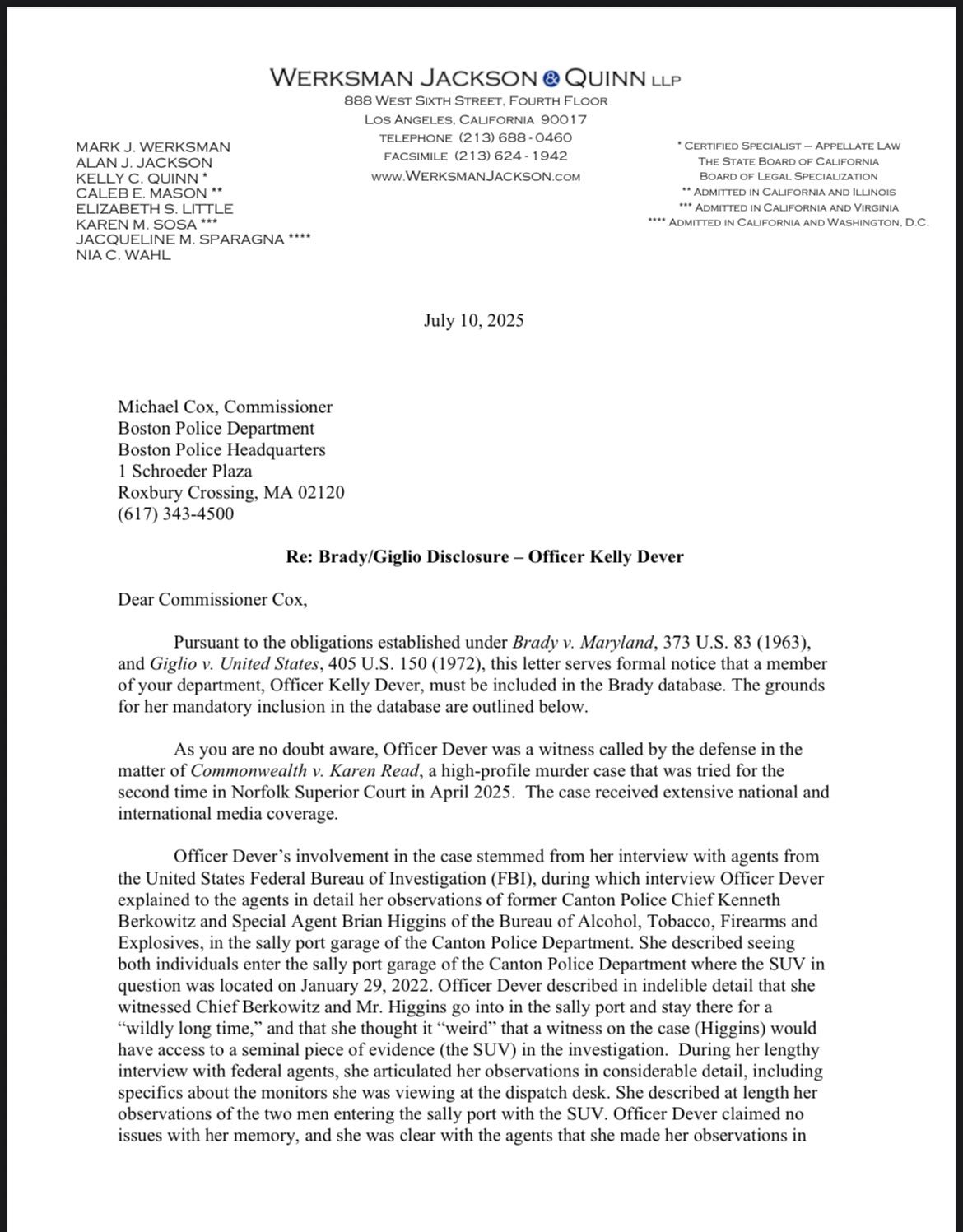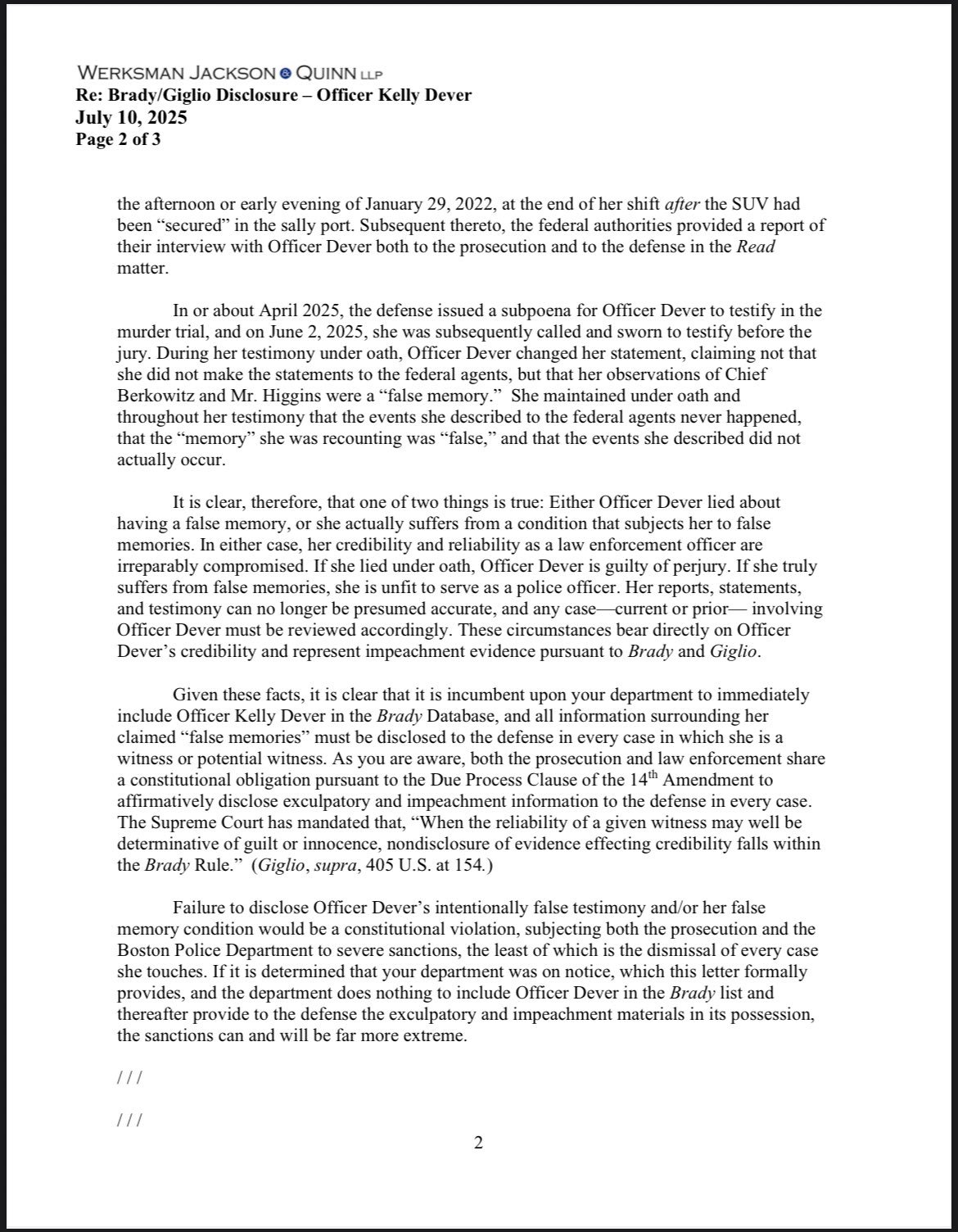
Image Credit: (Boston Police News)
Alan Jackson Retaliation Against Officer Kelly Dever
Weaponizing Brady: Alan Jackson’s Attempt to Destroy Officer Kelly Dever’s Credibility Crosses the Line
When Boston Police Officer Kelly Dever took the stand in the Karen Read trial, she became an unexpected flashpoint in one of Massachusetts’ most high-profile cases. Called by the defense as an “opposition witness,” Dever testified candidly—even when her answers didn’t support the narrative defense attorney Alan Jackson was trying to build.
Now, in what appears to be an act of retaliation, Jackson has fired off a scathing letter to Boston Police Commissioner Michael Cox demanding that Dever be placed on the Brady list—a move that would effectively end her law enforcement career.
But does Jackson’s claim actually rise to the level of a Brady issue? Or is this a troubling attempt to weaponize constitutional law for revenge?
The Background
During her June 2025 testimony, Officer Dever acknowledged that she had initially told federal investigators she saw Brian Higgins in the sallyport for a “wildly long time” on January 29, 2022. Later, after reviewing her shift records, Dever realized she had already gone off duty by then.
She contacted the FBI and reported to them that she must have been mistaken, attributing her earlier statement to a possible “false memory.” And when approached by the defense to testify in trial 1, she informed them that she had recanted her original statement. This led to an uncomfortable encounter between Dever and Jackson.
Jackson claims Dever’s change in recollection is evidence that she either committed perjury or suffers from a memory defect that renders her unfit to serve as a police officer. He has demanded that her name be added to the Brady database so that her credibility would be flagged in every case she has ever touched.

Image Credit: Court TV LIVE: MA v. Karen Read Murder Retrial, Day 25
What Is Brady—and Why Jackson’s Claim Fails
Under Brady v. Maryland (1963), prosecutors are required to disclose evidence favorable to the defense that is material to guilt or punishment. Giglio v. United States (1972) extends this to impeachment evidence that affects a witness’s credibility.
But Jackson’s argument stumbles for several reasons:
✅ Dever’s memory correction was fully disclosed in open court. The defense was aware of her prior statement and even subpoenaed her to testify about it. There was no hidden evidence or failure to disclose.
✅ A mistaken recollection is not perjury. Perjury requires an intentional falsehood. Dever’s willingness to acknowledge and correct her mistake under oath demonstrates integrity, not deceit.
✅ This is not material impeachment evidence for other cases. A corrected statement in an unrelated case does not automatically mean her credibility is destroyed for every investigation or trial she has participated in during her career.
The Real Issue: Retaliation
What’s far more troubling is Jackson’s own conduct. According to Dever’s testimony, Jackson and his team pressured her to stick with her original statement and threatened her with perjury charges if she didn’t support the defense’s version of events. When she refused and told the truth in court, Jackson retaliated by trying to destroy her career.
In court, Dever recounted:
“You threatened to charge me with perjury during our phone call prior to the first trial if I didn’t lie on the stand. Right now I’m telling you I did not see anything factually. I’ve been provided evidence by a timeline that it is not correct.”
And if we really want to get into conduct, just take a look at the image of Alan Jackson’s liberties with Karen’s sensitive body parts on a night out in Boston.
This isn’t about justice or constitutional safeguards. It’s about sending a chilling message to law enforcement: side with us, or risk professional ruin.
If Jackson’s gambit succeeds, it could deter other officers from coming forward in high-profile cases—especially when their testimony might displease powerful attorneys.
Officer Dever’s Courage
At its core, this is about more than one officer and one trial. Officer Dever did what every witness is sworn to do: tell the truth as they know it. For that, she now finds herself the target of an unscrupulous smear campaign.
Boston Police Department leadership should recognize Jackson’s letter for what it is—a tactical maneuver, not a legitimate Brady concern—and refuse to participate in the destruction of an officer’s career over a matter already aired and resolved in open court.
Justice depends on honest witnesses who are willing to speak the truth, even under pressure. Punishing them for doing so undermines the very system Jackson claims to defend.
If telling the truth puts a police officer’s badge at risk, then the real credibility crisis isn’t in the witness box—it’s at the defense table.
Related Articles
Luigi Mangione Death Penalty Dropped, Reshaping Prosecution Strategy
A judge has removed the death penalty as a sentencing option in the case against Luigi Mangione, delivering a major win for the defense and significantly narrowing the scope of the prosecution. The ruling eliminates the most severe potential punishment Mangione faced...
Neo Langston Arrested for Failure to Appear as LA Witness
Neo Langston was arrested in Montana this week on a Los Angeles Superior Court warrant for failure to appear as a witness, according to Lewis and Clark County Jail records. Montana authorities confirmed they were assisting the Los Angeles Police Department’s...
Hold On a Minute: What Media Is Saying About Nick Reiner
There has been exactly two real developments in the Nick Reiner case: a change in attorneys and a new arraignment date set. That’s it. No evidence dump.No discovery.No probable cause affidavit released.No forensic details confirmed on the record. And yet somehow —...





